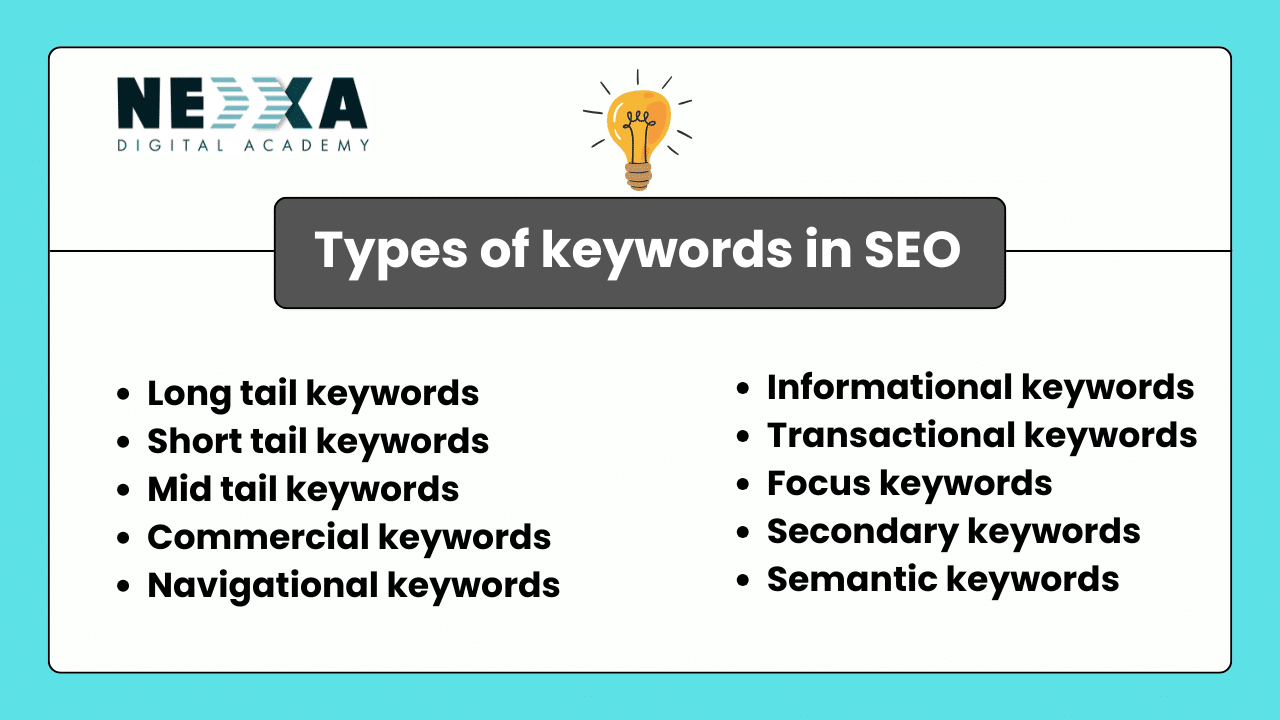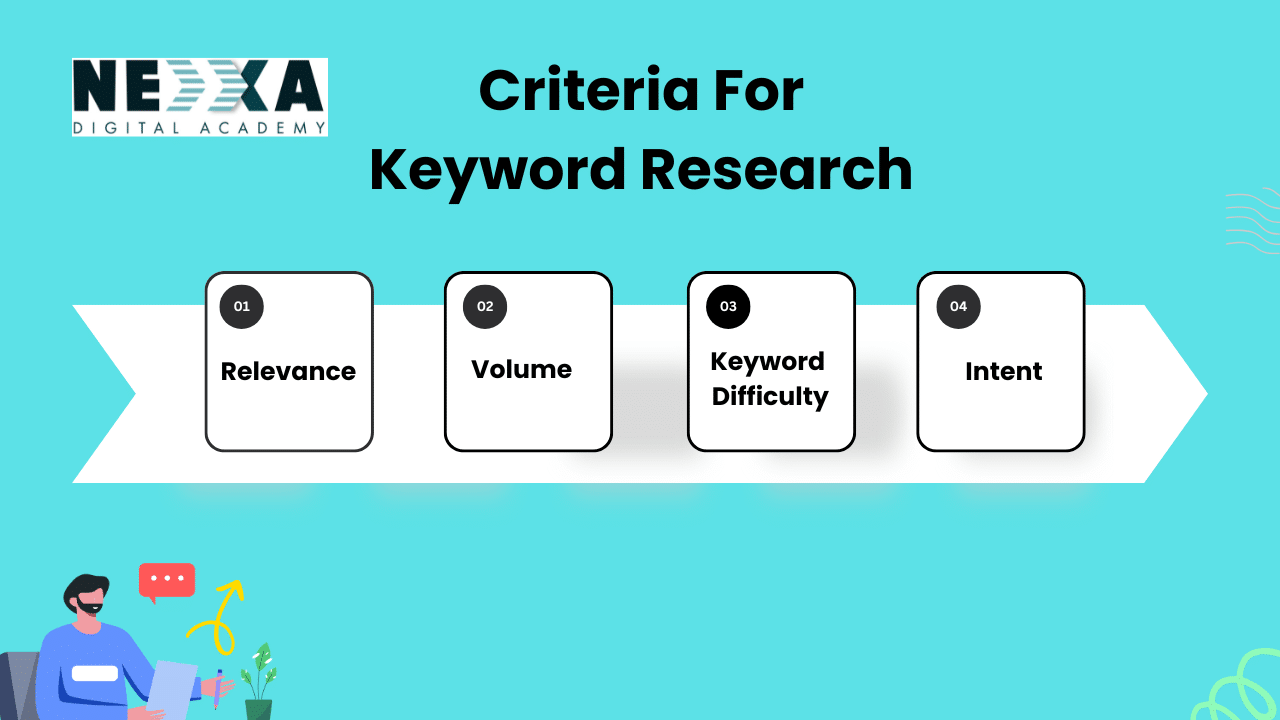10 Types of keywords in SEO and how to find them to rank in 2025

An effective search engine optimization depends on different types of keywords. It improves your page’s search ranking in search engine result pages. Stuffing these types of keywords into your content is ineffective.
There are different types of keywords in SEO, such as long-tail keywords, short-tail keywords, mid-tail keywords, Commercial keywords, Informational keywords, Navigational keywords, Transactional keywords, Focus keywords, Secondary keywords, and Semantic keywords.
So you must know how to do effective keyword research, and which types of keywords are suitable for your content. When choosing a good keyword, you should check whether it is relevant to your content, has search volume, and its keyword difficulty.
By understanding different types of keywords in SEO and how to use them to rank, you can create valuable content that reaches real visitors. For example, Commercial keywords are used when people are ready to compare and make a purchase.
Using keywords in your content, title, heading, and description helps search engines to understand what your page is about and positions your page at the top in search engines if visitors search for topics related to what you offer.
What are keywords, and the role of keywords in SEO?
Keywords are search terms or phrases that people type in search engines to search specific topics. The SEO process depends on keywords. The main objective of SEO is to rank your page for keywords that your target audience searches for.
If you are not rank your keywords, then your SEO process is kindly meaningless. For better result you need to know different types of keywords in SEO and how to find them to rank your page.
Learning different types of keywords in SEO help you to create content better way and and choosing right type of keywords helps search engines to understand what your page is about.
Using these keywords in your content, title, description, and heading leads to better ranking and shows your page at the top on search engines.
Understanding and using the right type of keywords can improve your content visibility, drive more traffic to your website. Therefore, different types of keywords in SEO based on user intent are an important factor in search engine optimization.

Different types of keywords in SEO with example
1. Long tail keywords
Long tail keywords are long search terms which contain three or more words. E.g.: (Ai based digital marketing Course).
These types of Keywords in SEO are more specific and help search engines to understand what details users want. Long tail keywords have high conversion rates to attract users with clear intent and low competition due to their specificity.
How to use for search ranking
For search ranking, find phrases related to your main keyword like ‘AI-based digital marketing’. Use these tyep of keywords in your Title, Description, URLs and contents.
A few websites make use of these specific keywords. So your site can easily appear on search engines and get real visitors who are looking for what you offer. It leads to ranking your content higher in search results.
2. Mid-tail keywords
Mid-tail keywords are search phrases with two or three words.
These types of keywords are more detailed than short tail, but not as long tail with medium search volume and competition. Eg:(Digital Marketing course). In some cases, these types of keywords are fairly competitive.
How to use for search ranking
Find a search term that is moderately long, like ‘Digital marketing course’. For search ranking, use these keywords in your blog posts, website content, title, description, and URLs.
These types of keywords are not too long and too specific and have a better balance between search volume and competition. So they help your sites attract visitors.
3. Short-tail keywords
Short-tail keywords are short search phrases that consist of one or two words. Eg:(Digital Marketing).
These types of keywords have high search volume and a high level of competition, but low conversion rates because of their shortness
How to use for search ranking
These types of keywords have high search volume and high competition because these keywords are searched for by many people, and a lot of websites also use them.
For better ranking, use these keywords in your important places like titles, descriptions, headings, and website content. Using short keywords helps search engines to understand clearly what you offer and reach more people.
4. Commercial Keywords
Commercial keywords are a type of keyword in SEO, that people use to search for a specific product, service, or brand.
Before making a purchase, buyers look at the discounts, images, and reviews using commercial keywords. It makes searchers ready to purchase. Eg: (Best digital marketing institution).
How to use for search rankings
Commercial keywords are mainly used by consumers who plan to make a purchase. Eg:‘Best laptop’. Using the right commercial keyword in your product pages, service pages, descriptions, and blog posts improves search ranking in search result page.
This leads to attracting visitors who are planning to buy something and guides them by providing useful information like reviews and comparisons.
5. Informational Keywords
Informational keywords are used by customers to know something about a specific topic.
These types of keywords are in a question format which starts with ‘What’, ‘Which’, ‘Who’, ‘When’, ‘Why’, and ‘How’. Eg:(What is Digital marketing).
How to use for search ranking
People use informational keywords to know about something like ‘how to do keyword research?’. You can use these keywords in your headings, titles, FAQs, and blog posts for better ranking.
If you give clear answers when people use these types of keywords when looking for information, it brings more visitors to your site and improves search rankings.
6. Navigational Keywords
Searchers use navigational keywords to get a specific website or page. It’s very important to use them in meta tags, content, and schema markup for ranking relevant navigational keywords. Eg: (Facebook Login).
How to use for search ranking
When someone is searching for a certain brand or website, they utilize navigational keywords, such as “Facebook login.”
For improved search ranking, include your brand name and key pages like Home, Blog, Login, and Contact. Add these keywords to the website’s description, headings, title, and content.
This makes it easier for people to get in touch with you online and helps search engines display your website when people are looking for your brand or website.
7. Transactional Keywords
Transactional keywords are a type of keywords used when users are ready to buy or sell something or in the final stage of taking action.
So these types of keywords are mainly used in product or service pages. These keywords consist of terms like ‘Buy’, ‘Sale,’ or ‘Order’. Eg: (Buy iPhone online).
How to use for search rankings
Transactional keywords are words used by people who are ready to buy something or take action like ‘Buy laptop’.
Using these keywords in your title, description, headings, service page, product page and call-to-action leads to better search ranking.
It aims to attract more customers who are ready to make a purchase.
8. Focus Keywords
Focus keywords are the main term used to which page you want to rank in search engine results. It is also known as the Primary keyword.
Usually, these types of keywords are found in the URL, body and title. Eg: (Organic rosemary essential oil).
How to use for search rankings
Focus keywords are the main phrases or terms which describe what your page is about. Use these keywords in title, description, headings, URLs and your content for better search ranking.
Confirm that your content gives genuine information which is related to your keyword. It helps search engines understand your content topic and show your page to the right people.
9. Secondary keywords
Secondary keywords are a type of keywords in SEO that are closely related to primary keywords.
It defines the primary keyword to help search engines understand what the page is about and helps to get additional results related to the search term. Eg:(if the primary keyword is ‘Digital Marketing’, the secondary keyword is ‘Social media marketing’).
How to use for search ranking
Secondary keywords are related to your primary keyword like ‘Online advertising’ if your primary keyword is ‘Digital marketing’.
To attract more traffic and improve search ranking use these keywords in your content, subheadings, meta description and image alt text.
10. Semantic Keywords
Semantic keywords are search phrases closely related to one another or different variations of a main keyword.
Searchers can read content naturally by using different variations of the main keyword. Eg:(‘Online marketing’ or ‘marketing in online’).
How to use for search ranking
Semantic keywords are a type of keywords that are closely connected to one another, such as “digital marketing strategies” or “strategies of digital marketing”.
Make use of these types of keywords mainly in your body text, headings, and subheadings helps to better ranking and make it more beneficial to users. These types of keywords help search engines to find the purpose of your content and lead the audience who are looking for similar topics to it.
Importance of keywords in SEO for better search ranking
One of the most important factors to a better ranking on search engine result pages and the basis of a successful SEO strategy are different types of keywords in SEO.
Utilizing appropriate keywords in your content, such as in the title, description, text, and URLs, helps the search engines and readers to understand the intention of the page. It attracts visitors and improves user experience and visibility.
There are different types of keywords in SEO that are used to target the audience and search ranking. A Good keyword must be relevant, have high volume, and not be overly competitive. It leads to ranking your content higher in search engine results and brings real visitors to your website.
Without the right keyword, your site won’t show on any search engine results page.
Criteria for keyword research

There is a keyword research checklist for SEO success. All types of keywords in SEO must be relevant to the needs of customers, have a large volume, low keyword difficulty, and match the search intent of the target audience. These are the criteria for keyword research.
By understanding the types of keywords in SEO, easy to choose the right keywords suitable for each page of your website.
Relevance
Your objective is to connect people who are seeking your brand, product, or services. So your target keyword must match what you offer to your customers.
Volume
Search volume means how many times your target keywords users search within a period on search engines.
Keywords with high search volume have effective user demand, and lower-volume keywords have low competitive opportunities.
Keyword Difficulty
Keyword difficulty shows how hard it is to rank a certain keyword on a search engine result page.
The highest level of difficulty in ranking a keyword is indicated by 100% of KD, while the lowest level of difficulty is indicated by 0% of KD.
A successful keyword strategy maintains a balance between a large volume of searches and a manageable level of keyword difficulty.
Intent
Understanding search intent is important for efficient SEO and content creation. It helps businesses improve search engine results and create content that relates to users’ needs.
CONCLUSION
Understanding and utilizing the right keywords in your SEO strategy helps you reach your target audience on your website and improves your search engine ranks in SERPs.
We discussed different types of keywords in SEO with examples, such as long-tail keywords, short-tail keywords, mid-tail keywords, commercial keywords, informational keywords, navigational keywords, transactional keywords, focus keywords, secondary keywords, and semantic keywords and how to use them to rank.
Each type of keywords in SEO serves a particular role. Therefore, you should utilize the appropriate keywords based on the needs of users.For example, Commercial keywords are a type of keyword when targeting people who are ready to make a purchase.
Search volume, keyword difficulty, purpose, and relevancy are all important factors to consider while conducting keyword research. It may help to drive more organic traffic to your site.
In order to attract the target audience, an effective SEO strategy involves both keyword research and the creation of valuable content using the right type of keywords in SEO.
Keep in mind that SEO is not just about using keywords. It’s about using the right keywords that match what people are looking for. When you know different types of keywords in SEO, you can create content better and drive more traffic to your website.
FAQ
1. What are the different types of keywords?
There are different types of keywords in SEO, such as long-tail, short-tail, mid-tail, commercial, informational, navigational, transactional, focus, secondary, and semantic keywords.
2. What are Mid-tail keywords?
Mid-tail keywords are a type of keyword by length that lies between Long-tail and short-tail keywords. These types of keywords contain 2 or 3 words.
3. Difference between short-tail and long-tail keywords?
Long-tail keywords and short-tail keywords are two different types of keywords in SEO.
Short tail keywords contain one or two words Eg, (Digital Marketing), but long tail keywords contain three or more words Eg:(Digital Marketing agency in Thrissur). Short-tail keywords have high competition, while Long tail keywords have low competition.
4. What is the importance of Focus keywords?
Focus keywords are one of the type of keywords in SEO, also known as Primary keywords. It helps to improve higher ranking in search engine result pages for that specific keyword and enhances user experience.
5. What are informational keywords?
In order to learn more about a particular topic, customers use informational keywords. Optimizing content with informational keywords helps to drive traffic to your website. These types of keywords start with the terms ‘What’, ‘Which’, ‘Why’,’ When’,’ Who’, and ‘How’.
